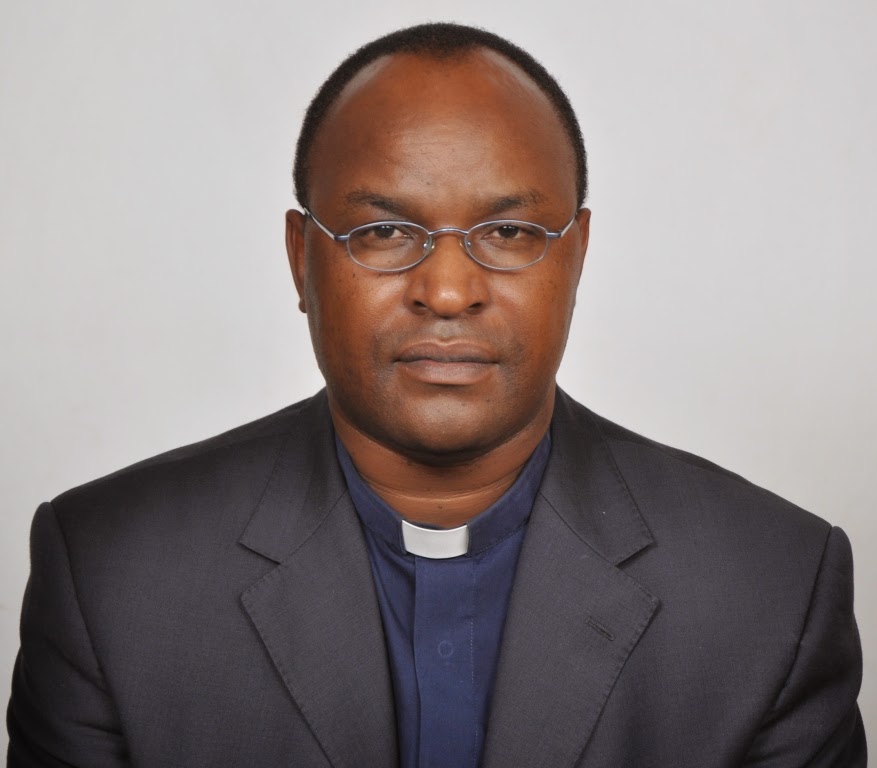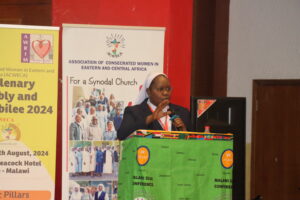MALAWI: ECM Responds to Unfair Criticisms of the 18th AMECEA Plenary Communiqué on Family

 |
| Rev. Fr. George Buleya, ECM Secretary General |
The Secretary General of Episcopal Conference of Malawi (ECM) Rev Fr
George Buleya has come up strongly against the unfair
criticism leveled against the 18th AMECEA Plenary’s
Communiqué that condemned same sex unions and other deviations that go
against human nature and natural law.
The press
statement came up following some criticism on the communiqué that was produced
at the end of the AMECEA (Association of Member Episcopal Conferences in
Eastern Africa) plenary assembly and insinuating that in matters dealing with
homosexual unions, what the Church in this region has said is at variance with
indications from His Holiness Pope Francis and the teachings of the Catholic
Church contained in its own catechism.
The article which was given unfair criticism was on “The Family as the Nucleus of Life”. The article stated that “……….We affirm institution of marriage as an
indissoluble union of love between a man and a woman open to procreation and
denounce any attempt to redefine this institution. Family life must be
respected, promoted and protected so that it can provide men and women who can
weave a social fabric of peace and harmony. We strongly condemn same sex unions
and other deviations that go against human nature and natural law……..We urge
for the protection and defence of the family at all costs as that is the
beginning and pillar of human life and society……..”
In his press
statement Fr Buleya said that although it is not within the tradition of the
Catholic Church in Malawi to be engaging people in the media over misrepresentations
of the Church’s doctrine, but this case was necessary because of gravity of the
accusation and its potentiality of misleading and confusing people.
“That is why I
have been compelled to put a few thoughts together and situate the matter
raised in the communiqué in its rightful context. I will do so by situating the homosexual
union issue within the context of the communiqué, secondly, within the wider
teachings and indications of the Catholic Church,” read the statement.
the Catechism of the Catholic Church
been suggestions in the recent past criticizing the communiqué that was
produced at the end of the AMECEA (Association of Member Episcopal Conferences
in Eastern Africa) plenary assembly and insinuating that in matters dealing
with homosexual unions, what the Church in this region has said is at variance
with indications from His Holiness Pope Francis and the teachings of the
Catholic Church contained in its own catechism.
not within the tradition of the Catholic Church in Malawi to be engaging people
in the media over misrepresentations of the Church’s doctrine (there are many
of those, by the way!), the levels of interest generated by this accusation and
the potential this line of thinking has in misleading and confusing people is
such that I have been compelled to put a few thoughts together and situate the matter
raised in the communiqué in its rightful context. I will do so by situating the homosexual
union issue within the context of the communiqué, secondly, within the wider
teachings and indications of the Catholic Church.
AMECEA region meet (and that is once every three years and from now it will be
once every four years), their discussions are guided by a theme that they carefully
choose for themselves. This time around,
for the meeting that was held in Malawi, the guiding theme was “New Evangelization
through True Conversion and Witnessing to Christian Faith”. The theme was chosen to reflect and explore the
linkages between the Apostolic Exhortation Africae
Munus, the Synod on Evangelization and the just-ended Year of Faith. Recurrent in this theme are issues of (i) New
Evangelization; (ii) true conversion, and (iii) witnessing to the Christian
faith.
purposes of discussing this theme, as is the case in many such meetings, the
theme was subdivided in seven subthemes, one of which focused on the role of
the family and Small Christian Communities.
It is in this context, and after thorough discussions, that the Bishops
sought to defend the role of the family against all kinds of threats, including
the very definition of family. It is in
this defense that the Bishops mentioned the issue of homosexual unions, and
this is what they said:
in our region is now more real than ever before . . . We affirm institution of marriage as an
indissoluble union of love between a man and a woman open to procreation and
denounce any attempt to redefine this institution. Family life must be promoted
and protected so that it can provide men and women who can weave a social
fabric of peace and harmony. We strongly
condemn same sex unions and other deviations that go against human nature and
natural law. (see point no. 3 of the Communiqué)
Bishops (including Archbishops and Cardinals) from the eight countries did was
simply in this regard to affirm the definition of marriage as an indissoluble (that is, life long and therefore no divorce!)
union of love between a man and a woman (that
is, not people of the same sex nor with species other that human beings!)
open to procreation (that is, with an
inherent readiness to have children).
This is what the Catechism of the Catholic Church teaches and this is
what the Church has held and passed on for centuries (see, the Catechism of the
Catholic Church No.1601 and The Code of Canon Law, canon 1055). In the communiqué, the Bishops are not
talking about homosexuality per se –
no – the Bishops are talking about homosexual unions prompted by what they see as misguided efforts to redefine
marriage and family to include homosexual unions.
indications of the Catholic Church
difference between homosexuality and homosexual
unions is key to comprehending and appreciating the various pronouncements and teachings
of the Catholic Church in these matters.
Homosexuality as a sexual orientation or a tendency is different from a
homosexual action or even union. When
one is a homosexual, it does not mean that he or she will actively indulge in
homosexual acts just like when one is heterosexual it does not mean that he or
she will actively indulge in heterosexual activities. One may be homosexual in orientation and not
engage in homosexual acts, and one may not be a homosexual and nevertheless
indulge in homosexual acts (as is the case with heterosexuals living in the
limited conditions in of prisons).
Following this
distinction, the teaching of the Catholic Church has always been that the
homosexual condition is disordered, but not sinful in itself. It is in line with this teaching that His
Holiness Pope Francis in July 2013 said that he would not judge anyone for
their sexual orientation. However, once
a person with this orientation or indeed a person without this orientation indulges
in homosexual acts, the Church has always taught that such acts must always be
judged as objectively evil and totally unacceptable. The homosexual unions that the AMECEA communiqué condemns are but homosexual actualizations
and not homosexual condition or orientation! A homosexual union is not on the level of
sexual tendency or orientation, it is on the level of sexual act!
So it is indeed that in
the same one, holy, Catholic and apostolic Church, when we are dealing with
homosexual acts and unions, the Church does not miss its words: these are
objectively evil and totally unacceptable; but in front of the homosexual
orientation and homosexual persons, the attitude of the Church is non judgmental;
yes their condition is disordered but not sinful in itself.
So, for those who
understand the teachings of the Catholic Church and the inherent truth in them,
there is no contradiction in substance, meaning or direction between what the
AMECEA Bishops have said in their communiqué and what Pope Francis and the
Catechism of the Catholic Church say on the same!
Conclusion
employed by the Catholic Church in its teachings where certain actions are judged to be objectively
right or wrong while at the same time refraining from judging the actual persons is in line with and stems from
Jesus’ own ethical indications: condemn sin but love the sinner! What the Episcopal Conference of Malawi
Bishops wrote in their Pastoral letter, Catholic Teaching on Homosexuality,
Abortion, Population and Birth control, underscores this dialectic:
must ensure that homosexual persons and those indulging in homosexual acts, if
any exist in their care will not be misled to believe that the living out of
this orientation in homosexual activity is morally acceptable option. It is not.
(However) as a loving mother and reflecting the unconditional love of
God, the Church understands that for most of the homosexual persons, their
condition is a trial. As such, they must
be accepted with respect, compassion and sensitivity. (see 3.1.3 page 8)
Communiqué, the Pope and the Catechism of the Catholic Church say on this
matter belong to the teaching heritage of the one, holy, Catholic and apostolic
Church! No contradictions at all!
Prince Henderson, ECM Communications Officer


